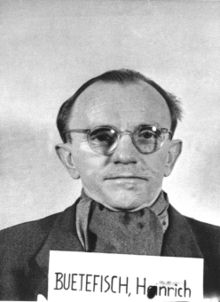Heinrich Bütefisch

Heinrich Wilhelm August Bütefisch (born February 24, 1894 in Hanover ; † August 13, 1969 in Essen ) was a German chemist and board member of IG Farbenindustrie AG. In the National Socialist German Reich he was a military economic leader and was convicted as a war criminal during the Nuremberg trials .
Life
Bütefisch, son of a teacher, began studying chemistry at the Technical University of Hanover in 1911 after completing his school career . As a war volunteer, he took part in the First World War from 1914 and was therefore only able to complete his studies after the end of the war. He received his doctorate in 1920. He then worked for BASF and worked at the ammonia plant in Merseburg . He became head of department in 1925 and was granted power of attorney in 1927 .
From 1930 Bütefisch was head of the Leuna works of IG Farben. In 1936, as an employee of Carl Krauch , he was commissioned for oil production in Hermann Göring's four-year plan . Bütefisch joined the NSDAP in 1937 ( membership number 5,771,136) and in 1938 became a board member of the IG Farben Technical Committee. In 1938 he was appointed military manager. From 1939 he was an honorary member of the SS , was promoted to Obersturmbannführer and belonged to the Friends of the Reichsführer SS . In 1939 he was also elected a member of the Leopoldina . From 1941 he was head of fuel production at the IG Farben factory in the Auschwitz-Monowitz concentration camp and was responsible for the brutal treatment of many forced laborers. Bütefisch, winner of the " Knight's Cross of the War Merit Cross ", was arrested in 1945 by the US Army .
Bütefisch was sentenced to six years in prison in the IG Farben trial in 1948 for enslavement of forced laborers ; In 1951, like many other convicts, he was released early from prison in Landsberg's war crimes prison . Subsequently, he was a member of the supervisory board of various companies such as Ruhrchemie AG , the mineral oil company Gasolin AG and Feldmühle . In March 1964, Federal President Heinrich Lübke awarded him the Great Federal Cross of Merit for his work on the Ruhrchemie AG supervisory board, regardless of his National Socialist past . A few days later, Bütefisch's conviction became public knowledge. Thereupon the order was revoked again - for the first time in the history of the Federal Cross of Merit. Bütefisch appeared as a witness in the 1st Frankfurt Auschwitz Trial.
literature
- Ernst Klee : Personal Lexicon for the Third Reich . Fischer Verlag, Frankfurt am Main 2003, ISBN 3-10-039309-0 .
- Hermann Weiß (Ed.): Biographical Lexicon for the Third Reich . S. Fischer, Frankfurt am Main 1998, ISBN 3-10-091052-4 .
Web links
- Short article about H. Bütefisch on the page "Zyklon-B"
- Wollheim Memorial - Heinrich Bütefisch
- DeutschlandRadio Berlin July 30, 1998, 7:05 p.m.: The Nuremberg trials against leading industrialists
Individual evidence
- ↑ a b c d Ernst Klee: The dictionary of persons on the Third Reich. Who was what before and after 1945 . Fischer Taschenbuch Verlag, Second updated edition, Frankfurt am Main 2005, pp. 83–84
- ↑ a b c Hermann Weiß (Ed.): Biographisches Lexikon zum Third Reich , 1998, p. 68.
- ↑ a b Wollheim Memorial - Heinrich Bütefisch
- ^ Solveig Grothe: 60 years of the Federal Cross of Merit. The sheet metal avalanche on einestages.spiegel.de
- ↑ spiegel.de April 8, 1964: Debit and credit
| personal data | |
|---|---|
| SURNAME | Bütefisch, Heinrich |
| ALTERNATIVE NAMES | Bütefisch, Heinrich Wilhelm August (full name) |
| BRIEF DESCRIPTION | German chemist |
| DATE OF BIRTH | February 24, 1894 |
| PLACE OF BIRTH | Hanover |
| DATE OF DEATH | 13th August 1969 |
| Place of death | eat |